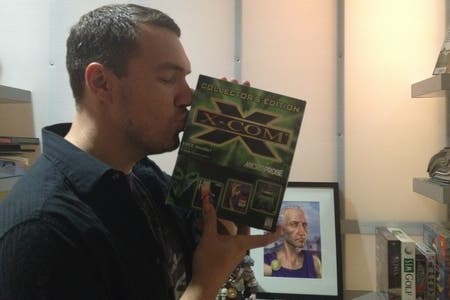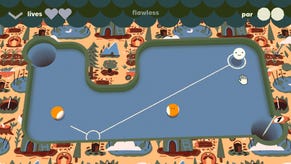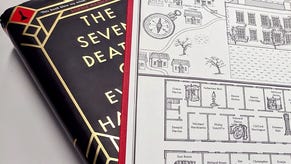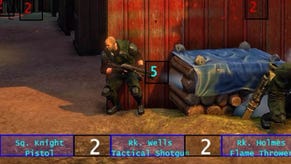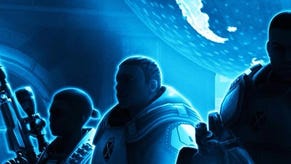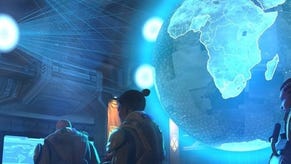The re-making of XCOM
From the archive: Looking back at how Jake Solomon completed his 10-year mission.
Every Sunday we dig an interesting article out of our massive archive for you to enjoy again or perhaps read for the first time. With an XCOM expansion due next week in the shape of Enemy Within - and we'll have the review for you on that this coming Monday - this week we thought we'd take you back to last year's reboot, and the tale of how Jake Solomon resurrected one of gaming's most treasured series.
Three-and-a-half years ago, Jake Solomon called a meeting of the XCOM remake design leads. Something wasn't right, and it had been nagging him for ages.
Firaxis, the Baltimore-based developer best-known for making Civilization under Sid Meier's steady hand, had been working on XCOM for a year. Much had been done. Jake was nervous because he knew what he was about to ask his colleagues to do.
Jake didn't like XCOM's combat. Combat 2.0, as it was then called, was very similar to the combat in the original game. For him it was too similar. Its turn-based action had time units and large squads, just like the original, and cover was nowhere near as important as it is now. But layered on top were unit abilities and other new features. It was a straight up remake of the original with a sprinkle of modern day mechanics, and it wasn't working.
"We were overburdening this old combat system with all these new things we wanted to do," Jake tells me in the lobby, not far from the room they call the Fish Bowl. "It was a mistake design wise."
"I was like, I don't think this is working all that well. I think I need to go away and think about this for a little bit. People were like, this is cool! This is just like the original XCOM! But people who didn't know the original XCOM were like, this is a little weird. I get what's fun about this but it's a little strange.
"I thought, I'm not doing the right thing. I need to rethink. I can still make a turn-based, tactical squad-based game, but if I forget about the original for a second and say, look, I want to make the best turn-based squad game, what would the mechanics actually be, they would actually be a lot different from the original game."
The problem was the development team had for a year been gaining momentum on the project, and had just showed a key "vertical slice" of the game to the rest of the company. Solomon knew it wouldn't be easy going back to the drawing board, but the team pulled up their sleeves and got to work.
A year later, Jake asked the team to do the same thing again, but in reverse.
Again, he again called a meeting of the design leads, but this time it wasn't the combat he wanted to talk about, but the other side to XCOM: the strategy. Jake's prototypes and all the work done up to that point had made the strategy layer very different to the original's. "It was this big thing and it was turn-based," he remembers. "The strategy layer was very difficult for me design wise. I kept doing new prototypes and they weren't any good."
Again, Jake was nervous. But it was even more pronounced this time. What he was about to ask the team to do was, effectively, restart a whole half of the game two years into development.
"That was a one-off meeting," lead producer Garth DeAngelis tells me. "He pulled us in, saying, 'we've got to sit down and talk.' We immediately knew something big was going to change."
"I was like, well... I think we should go back closer to what the original game was," Jake says. "That was a moment where I was pretty confident it was the right decision, but, you know... obviously they supported me but they were like, come on man. Seriously?"
"That was a huge decision," Garth says. "It's scary at that point when you're supposed to be mid-production and you're restarting a whole half of the game. But we all completely had Jake's back with respect to the reason why he wanted to do it. To everyone's credit, the entire team's credit, everyone got on board and made it happen."
"It was late enough that I was like, this had better be the right decision because we cannot restart," Jake adds. "You feel a lot of that pressure because everyone's looking at you like, all right, you've been changing a lot. You don't get another one. Are you sure you're doing the right thing? You're just like, this will be great! This one's going to work!"

Man on a mission
Jake Solomon is a 12-year Firaxis veteran who has pumped much of his working life into making Civilization, but XCOM is the game he's always wanted to make. Colleagues remember him nagging about it in management meetings as far back as 2002. Even before publisher 2K green-lit the project Jake, in his spare time, had done much thinking and prototyping trying to flesh out how a modern day XCOM remake would work. Other projects came and went: Civilization Revolution, Civilization 3, SimGolf, Pirates!, Civilization 4. But it was XCOM that he really, really wanted to make happen.
Art director Greg Foertsch, who has been with Firaxis since the beginning, says Solomon and the small, three-man team had begun working on XCOM in secret, so confident were they that it would be approved. "Honestly I don't think I ever had any fear it wouldn't get green-lit," he says. "When we were working on this it was always like, it's just going to happen. Maybe that was stupid and naïve. Jake and I were both like, we're making this. We went into this like, we're doing this."
The skunkworks project went unnoticed by some 80 Firaxis staff. "I wasn't doing that to be a jerk," Greg continues. "I was doing that because when I showed them I wanted to get the reaction from the company to see if I was onto it. If I was off of it I would know immediately before we showed it to 2K. We made this thing and I felt pretty confident what we were doing was good. So we made this."
The this is a pre-visualisation simulation video designed to show what the XCOM remake could be. "It wasn't a teaser. It wasn't a sizzle movie. It was literally as if you were watching somebody playing the game, with fake UI," Greg recalls.
"It was a three minute movie. But it had outside and inside, extra interior, largest alien, smallest alien, soldiers, cameras that are like what you are see now. The isometric camera, can you play it? And establishing those distances."
Then, in May 2008, the time came to show the powers that be at 2K what Firaxis had been working on. "I think they were expecting something a little less involved and we kind of surprised them a little bit," Greg says. "They got excited and we got excited. It just went from there. It was a very fun ramp for the project."
Jake was, predictably, delighted. Finally he would have the chance to remake the game he loved the most. Now was his chance.
He spent the next four years loving XCOM all over again and, more importantly, getting everyone else at Firaxis to love it just as much as he did. He would hold Friday afternoon beer sessions where he would get a room full of PCs and fire up the original, standing over people's shoulders telling them: "here's what you do!" At one point during development, playing the XCOM multiplayer replaced Team Fortress Tuesdays.
It was a process the studio had to go through. The Julian Gollop-made original launched in 1994 - an incredible 18 years ago. As Greg points out, some of the team had yet to hit puberty when it released, and it was imperative that everyone involved knew what it was about.
"Jake is maybe the most knowledgeable XCOM person I've ever met," he says. "He really has boiled it down. Jake would help other guys to indoctrinate them into the process. As we grew the team, every time they'd come in it was like, okay you need to spend a day playing the original. If you haven't played it, you need to play it. You need to understand what you're making."
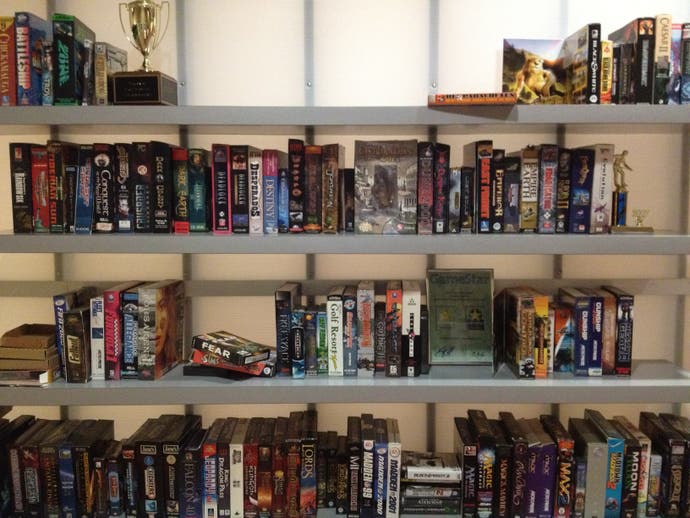
Improving perfection
Firaxis' starting point was to distil the essence of XCOM. What was it about the game that fans loved? What makes XCOM XCOM?
The team settled on a handful of core characteristics: permanent death, destruction and turn-based combat. From here other elements were deemed too good to drop: psionic powers, rookies that get killed, Sectoids, the Sky Ranger - all these things had to be included.
All the while, the pressure the developer put itself under was intense. Here it was remaking not just a game, but gamers' memories of what that game was. XCOM for many is a cherished, untouchable glint in their eye - a memory of a summer spent husked over a computer monitor desperately trying to fend off an alien invasion that never ended. There was nothing like XCOM when it came out. There still isn't.
"It was a huge challenge," Greg says. "If you think too much about it it can be very scary. So I choose to try to not think too much about it."
Crucially, Firaxis refused to let itself become a slave to the original. It wanted to stamp its own authority on the remake. This isn't XCOM HD. This is Firaxis' XCOM: Enemy Unknown.
We said, okay, we're going to be humble about what they've done. You need to look at it and go, yeah, even at 320x240 graphics and with an isometric camera, it's hard to beat some of the decisions that were made.
"Because we're probably a bit more mature - let's call ourselves mature instead of old - group of developers, we didn't go into it with all guns blazing, going, we're going to change everything!" Greg reckons. "We said, okay, we're going to be humble about what they've done. You need to look at it and go, yeah, even at 320x240 graphics and with an isometric camera, it's hard to beat some of the decisions that were made. They're right for that game and certain mechanics. But we're also not slaves to what was originally done to the point where we were blinded to see what opportunities we had to change things and possibly even improve them."
And improve the team did, risking the wrath of the XCOM faithful. Soldiers now have abilities. The squad size has been reduced to a maximum of six. Randomised maps were ditched. Multiplayer has been added. And the design of some of the iconic aliens has been altered.
One example are the terrifying Chryssalids, a humanoid character in the original, now a more alien quadruped. "He was a humanoid-ish character in the original because it was a sprite game and they had a set size that it had to fit into," Greg says. "So for us we looked at it and said, okay, we can make characters that are not humanoid. This guy seems to fit it, so let's make him a quadruped. That was our mindset going in."
The changes Firaxis made to the Chryssalids exemplify its design philosophy with XCOM: make changes where necessary, where appropriate, but there's no need to redesign the wheel. Leave that up to 2K Marin.
"You don't want to disappoint the fans," Greg says. "You want them to like what you've done. I'll admit it. I read the forums. If anybody thinks I haven't read all the comments about the Mutons and Sectoids... And I hear where they're coming from. We have reasons for the decisions we've made. The fact a lot of people like the decisions we've made makes me feel good."
In good hands
There is often much negativity in the game industry. Sceptical gamers cast worried eyes over corporations who turn once beloved franchises into bloated, puss-filled cash cows. Developers take on IP promising respect only to crush cherished memories with micro-transactions and online passes. Firaxis' XCOM is yet to launch, so we don't know quite how successful it'll be, but having met Jake - the man who made it happen - I can't help but feel there was no-one better for the job.
It's clear all of Jake's design decisions were made out of a genuine love for XCOM. Take the decision to reduce the squad size cap, for example. Some fans have lamented this move, but Firaxis makes it sound like perfect sense.
"It's pretty simple," Garth explains. "When we had more squad members in those prototypes each move was less meaningful. We found five to six to be that sweet spot. After that amount the map time also dragged on. We want the experience between strategy and the HQ to have this nice flow where you're going back and forth between them. We don't want you playing for an hour-and-a-half on every single map because you would lose momentum."
"I think people hear it and they're like, why is that gone? I liked that," Jake says. "But I would challenge some people: did you actually like that all the time? I go on the forums once in a while and I see some hardcore XCOM fans actually defend this decision. They're like, look, even if I brought our 18 guys I would really only move six of them and keep everyone else on the Sky Ranger. You don't really need that amount. It's one of those things that sounds cool. In the original it worked when you used them as fodder.
"But what it comes down to is you want the highest impact decisions with a few troops who have bigger depth and less breadth of carbon copies where they just do the same thing. We chose to go for deeper soldiers, deeper individual units."
Other changes were harder to arrive at. This new XCOM ditches the randomised maps of the original in favour of custom made environments - a move some fans complained about. They weren't the only ones.
"That was a very big internal debate," Jake reveals with a sigh. "We started doing it and random maps were always in. Even at our vertical slice we had random maps. That was something where I had a death grip on an idea. I was out there marching by myself. Everybody else had been like, er, Jake... it kept coming back up: random maps, random maps. To me it was important because when you play the game so much you don't want the player to have that experience of, like, oh boy, this again."
It isn't marketing fluff: this is the game I've always wanted to make, and I've been agitating to make this game forever.
So, what happened? "To be fair, with Unreal Engine 3, it really is difficult to have that kind of dynamic system," Jake explains. "I don't want to put that on Epic. It's not. It's certainly something we could have done. But I was already asking so much of the team technically with destructible environments and all these things we had never done and a lot of teams still don't do. I was asking all these things and then I was like, yes, and also random maps.
"They didn't look good. I just don't know that they could have looked have looked good. So the compromise was, look, can we make so many maps, what's the number in your head where you would be happy with this number of maps? I was like, look, if the player can play through - I don't know how we settled on this - but if you play through twice and you don't see the same map, that's a great experience. That in itself was crazy. I say this - I don't know this for sure - but I would have to say we have made as many maps as anyone has. In an Unreal Engine game, we just have a very large number of levels."
How many maps? Over 80. And when you factor in variation for special missions, that number rises to 100.
"Holding on to that number was just one of those things," Jake continues. "Getting to that point and then also throughout the game being like, oh my god are we really going to make this many maps? There were a couple of dicey moments where we were like, you know... And even towards the end Garth was like, how much do you love that map? A lot. That worst map we have, I love it a lot. I will not give up anything. I'm drawing a line in the sand."
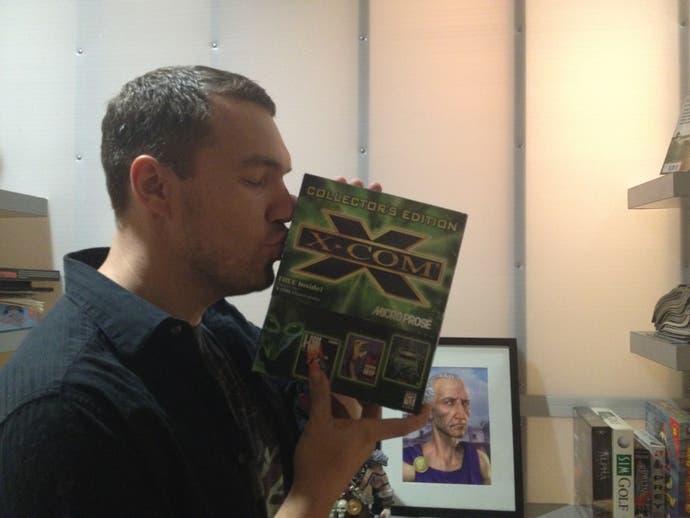
The end. The beginning
Yesterday marked the last day Jake worked on XCOM: Enemy Unknown. Officially, that makes for over four years of development, if you start from when the project was green-lit. But in truth he's been making the game in his head since he first played the original 18 years ago. This was his moment, and now it's over.
"It isn't marketing fluff: this is the game I've always wanted to make, and I've been agitating to make this game forever," he says with a smile. "I was making prototypes a long time ago, before I even knew what I was doing. It's a weird feeling to get to this point. I'm very proud of this XCOM. I'm proud of the game the team made. But it's over. It's very weird, because I have been thinking about this and living this intensely for four-and-a-half years now."
And yet, he's not tired of XCOM. Like the best game designers, the next big thing is always at the back of mind.
"Designers always have ideas. I do think this can grow. This is the game I had to make. What happens next? I don't know. This is a game and a game type and a genre, you could tell a lot of stories with this type of game. That's what I'm excited for. It can still be XCOM, but it could have a lot of settings. It could tell a lot of stories. I'm not tired of it. Not yet! I'll recharge. But I do think it's the type of game set-up where you've got a strategic layer, you've got a combat layer, and the story is so broad of what's XCOM, that you could tell a lot of stories. You could make a lot of games that could be considered XCOM.
"And that's true of the depth of my thought at this point. I'm like, I could do a lot of things."
